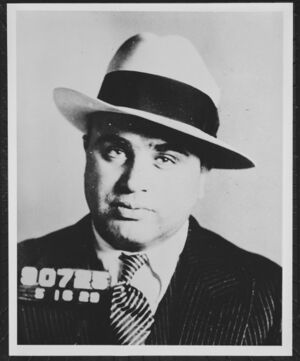Mafia
- This article is about criminal organization. For other uses of the word "mafia", see Mafia (disambiguation).

The mafia is a notorious criminal organization that has been terrorizing Italy for centuries. From its humble beginnings as a group of neighborhood thugs to its current status as one of the most powerful crime groups in the world, the mafia has an extensive history filled with violence, corruption, and spaghetti. The mafia was a tight-knit group, and they would do anything to protect their family and their territory.
History[edit | edit source]
The mafia originated in Sicily well before there were any "gangsters", with secret codes and handshakes to avoid speaking to polizia (police).
Influence in America[edit | edit source]
Fast forward: The mafia had set up shop in major cities like New York, Chicago, and Las Vegas and were living the high life, e.g. fancy cars, nice suits, and shitloads of money. They had a hand in all kinds of illegal activities such as gambling, prostitution, and trading old pokemon cards.
Working in the shadows[edit | edit source]
The Italian mafia is like a secret pizza party that operates in the shadows, using spaghetti code to encrypt their lasagna plans. They are the ninja turtles of organized crime, with each member wearing fedoras and speaking only in dramatic hand gestures. The chef is the pizza master, orchestrating the criminal operations from his underground gelato parlor, where he sips espresso and plots to take over the world with cannoli cannons. The mafia's power lies in their ability to make offers that can't be refused, like forcing you to eat an entire tiramisu if you don't pay your dues. In the world of the Italian mafia, pasta is power, and marinara is might. It's a nonsensical spaghetti western where the only law is the law of lasagna.
The fall[edit | edit source]
Italian racial stereotypes played a significant role in the downfall of the mafia. When word got out that the organization was of Italian origin, society's perception immediately shifted. Instead of associating the mafia with criminal activities and power, people began to stereotype them as mere purveyors of spaghetti and pizza. This misconception greatly affected the reputation and operations of the mafia. Many members faced intense scrutiny and discrimination, leading to internal strife and external pressure. As a result, a significant number of individuals chose to leave the organization altogether, while others simply lost their motivation to continue. Only a dedicated few remained, struggling to maintain the once formidable empire amidst a sea of misunderstandings and prejudices.
|
